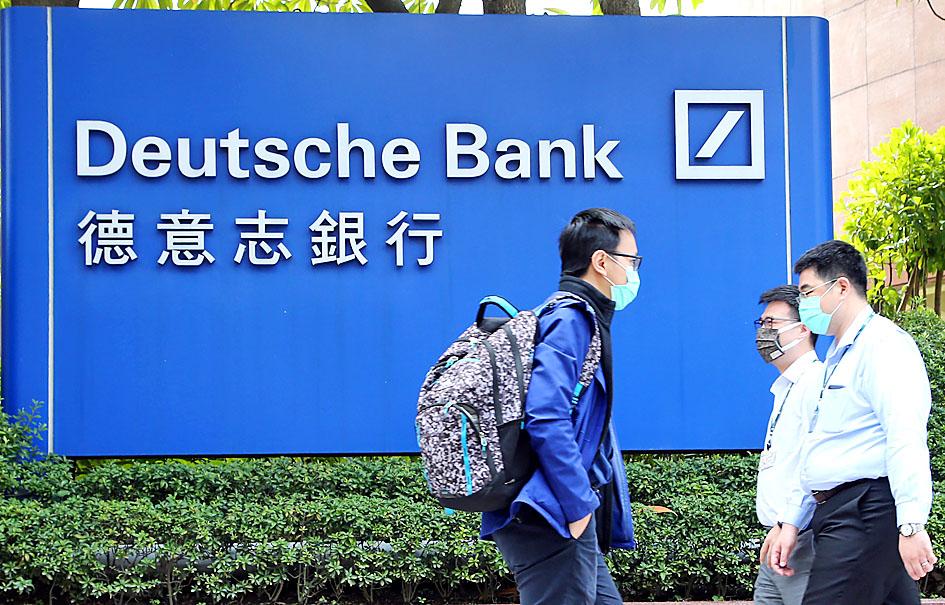The central bank has allowed Deutsche Bank to resume trading New Taiwan dollar deliverable and non-deliverable forwards, one year after it suspended the business as part of a crackdown on speculation in the local currency.
The central bank in February last year punished four foreign banks for helping grain merchants speculate in NT dollar deliverable forwards in a breach of foreign exchange regulations.
It revoked Deutsche Bank’s license to trade NT dollar deliverable and non-deliverable forwards, as well as suspending the lender’s ability to trade foreign exchange derivatives for two years.

Photo: CNA
The central bank also banned the Taipei branches of ING Bank NV and Australia & New Zealand Banking Group (ANZ) from trading NT dollar deliverable forwards and non-deliverable forwards for nine months.
Citibank Taiwan Ltd (花旗台灣) was suspended for two months.
The central bank said Deutsche Bank had shown improvement on compliance issues.
It is the only German bank in Taiwan and has served many local and foreign customers over the decades, the central bank said, adding that the lifting of the penalty would help Deutsche Bank to protect and advance the interests of its customers and employees.
The monetary policymaker has shown no tolerance for NT dollar speculation, as such practices destabilize the foreign exchange market and hurt Taiwan’s export-reliant economy.
The NT dollar picked up about 2.5 percent last year, driven by strong global demand for Taiwan-made electronic components used in smartphones, PCs, wearable devices, TVs, high-performance computing devices, vehicles and Internet of Things applications.
In July last year, the central bank lifted the trading curbs on ING and ANZ after their involvement in the same case.
The central bank has repeatedly intervened in the foreign exchange market, but has shown more restraint after the US puts Taiwan on its currency speculation watch list.

BYPASSING CHINA TARIFFS: In the first five months of this year, Foxconn sent US$4.4bn of iPhones to the US from India, compared with US$3.7bn in the whole of last year Nearly all the iPhones exported by Foxconn Technology Group (富士康科技集團) from India went to the US between March and last month, customs data showed, far above last year’s average of 50 percent and a clear sign of Apple Inc’s efforts to bypass high US tariffs imposed on China. The numbers, being reported by Reuters for the first time, show that Apple has realigned its India exports to almost exclusively serve the US market, when previously the devices were more widely distributed to nations including the Netherlands and the Czech Republic. During March to last month, Foxconn, known as Hon Hai Precision Industry

Taiwan Semiconductor Manufacturing Co (TSMC, 台積電) and the University of Tokyo (UTokyo) yesterday announced the launch of the TSMC-UTokyo Lab to promote advanced semiconductor research, education and talent development. The lab is TSMC’s first laboratory collaboration with a university outside Taiwan, the company said in a statement. The lab would leverage “the extensive knowledge, experience, and creativity” of both institutions, the company said. It is located in the Asano Section of UTokyo’s Hongo, Tokyo, campus and would be managed by UTokyo faculty, guided by directors from UTokyo and TSMC, the company said. TSMC began working with UTokyo in 2019, resulting in 21 research projects,

Ashton Hall’s morning routine involves dunking his head in iced Saratoga Spring Water. For the company that sells the bottled water — Hall’s brand of choice for drinking, brushing his teeth and submerging himself — that is fantastic news. “We’re so thankful to this incredible fitness influencer called Ashton Hall,” Saratoga owner Primo Brands Corp’s CEO Robbert Rietbroek said on an earnings call after Hall’s morning routine video went viral. “He really helped put our brand on the map.” Primo Brands, which was not affiliated with Hall when he made his video, is among the increasing number of companies benefiting from influencer

Quanta Computer Inc (廣達) chairman Barry Lam (林百里) yesterday expressed a downbeat view about the prospects of humanoid robots, given high manufacturing costs and a lack of target customers. Despite rising demand and high expectations for humanoid robots, high research-and-development costs and uncertain profitability remain major concerns, Lam told reporters following the company’s annual shareholders’ meeting in Taoyuan. “Since it seems a bit unworthy to use such high-cost robots to do household chores, I believe robots designed for specific purposes would be more valuable and present a better business opportunity,” Lam said Instead of investing in humanoid robots, Quanta has opted to invest